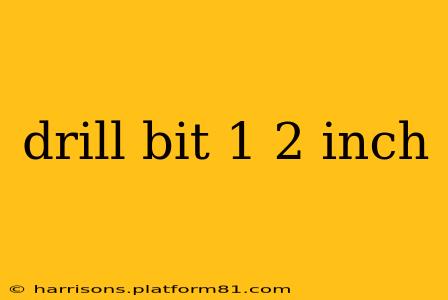Choosing the right drill bit is crucial for any successful DIY project or professional undertaking. A seemingly simple choice like a 1/2-inch drill bit actually involves a surprising amount of nuance. This comprehensive guide will explore everything you need to know about 1/2-inch drill bits, helping you select the perfect bit for your specific needs. We’ll cover various types, materials, applications, and frequently asked questions to ensure you’re fully equipped to tackle any drilling task.
What Types of 1/2-Inch Drill Bits Are There?
The seemingly simple 1/2-inch drill bit actually comes in a wide array of types, each designed for specific materials and applications. Understanding these differences is crucial for achieving clean, accurate holes and extending the life of your drill bits.
-
High-Speed Steel (HSS): These are the most common type and are suitable for general-purpose drilling in a variety of materials, including wood, mild steel, and plastics. They offer a good balance of performance and affordability.
-
Cobalt HSS: Containing cobalt increases the hardness and heat resistance of these bits, making them ideal for drilling tougher materials like stainless steel and other harder metals. They're more expensive than standard HSS bits but offer superior durability and longevity.
-
Titanium Nitride (TiN) Coated HSS: The TiN coating reduces friction and heat buildup during drilling, resulting in faster cutting speeds and extended bit life. This is a great option for various materials, offering increased performance compared to standard HSS.
-
Carbide Tipped: For extremely hard materials like masonry, concrete, or tile, carbide-tipped drill bits are necessary. The incredibly hard carbide tip ensures clean, precise holes even in the most challenging substances.
What Material Should My 1/2-Inch Drill Bit Be Made Of?
The material of your 1/2-inch drill bit directly impacts its performance and lifespan. Choosing the right material depends entirely on the material you're drilling.
-
Wood: HSS drill bits are generally sufficient for wood drilling.
-
Metal: For metal, cobalt HSS or TiN coated HSS bits provide better performance and longevity.
-
Masonry: Carbide-tipped drill bits are essential for materials like concrete, brick, and tile. Attempting to drill these materials with a standard HSS bit will likely result in a broken bit.
What is the Shank Type of a 1/2-Inch Drill Bit?
The shank is the part of the drill bit that fits into your drill chuck. The most common shank type for 1/2-inch drill bits is a round shank, which is directly compatible with most standard drills. However, you might also encounter other shank types depending on the application.
How Do I Choose the Right 1/2-Inch Drill Bit for My Project?
Selecting the correct 1/2-inch drill bit hinges on understanding the material you're working with and the desired outcome. Consider the following:
-
Material being drilled: This is the single most important factor in determining the appropriate bit type.
-
Desired hole size accuracy: For precision work, ensure your bit is accurately sized and sharp.
-
Drilling speed: Different materials require different speeds; consult your drill's manual for recommendations.
-
Coolant usage: For drilling tougher metals, a coolant may be necessary to prevent overheating and extend bit life.
What is the difference between a brad point bit and a twist drill bit?
Brad point bits are designed for precise drilling in wood, creating a cleaner entry hole with less tear-out. Twist drill bits, on the other hand, are more versatile and suitable for a wider range of materials, including metal and plastics. For a 1/2-inch hole in wood, a brad point bit would likely be preferable for its superior accuracy and cleaner hole.
What is the best drill bit for drilling through metal?
For drilling through metal, a cobalt HSS or TiN coated HSS bit is recommended. These bits offer superior hardness and heat resistance, leading to better performance and a longer lifespan when working with tough metals like stainless steel.
How long should a 1/2 inch drill bit last?
The lifespan of a 1/2-inch drill bit varies greatly depending on the material drilled, usage, and bit quality. Proper use and selecting the correct bit for the material will significantly extend its life. However, even with care, bits eventually wear down and will need replacing.
This comprehensive guide provides a solid foundation for understanding and selecting the right 1/2-inch drill bit for your projects. Remember, choosing the correct bit is vital for efficient, accurate, and safe drilling. Always prioritize safety and follow manufacturer instructions when operating power tools.
